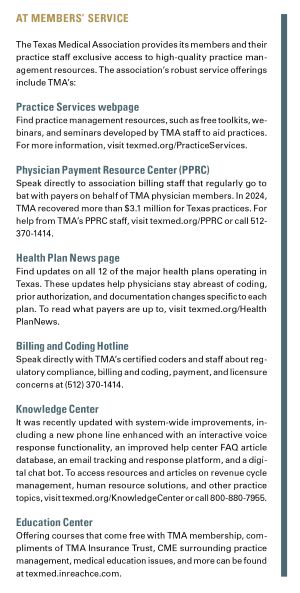
Spring family physician David Michalak, MD, and his wife, Michelle, run a tight practice. While Dr. Michalak takes care of patients, Ms. Michalak handles billing and payment tasks as their office’s sole practice manager.
Although the couple love being in private practice, Ms. Michalak said dealing with insurers to receive correct payment has been a “pretty painful” experience for their small business.
“It can be really frustrating to see claims denied or payment delayed for no reason,” she said. “We’re an independent practice. We don’t have [the] resources to face these challenges alone.”
After a health plan declined coverage of a patient’s continuous positive airway pressure machine last year, the Michalaks reached out to the Texas Medical Association’s free Physician Payment Resource Center (PPRC) in the hopes TMA specialists could resolve the denial.
Originally named the Hassle Factor Log, PPRC service began in 1989 in response to efforts by then-Medicare contractor Blue Cross and Blue Shield to recoup overpayments made to Texas physicians.
In response, TMA’s Council on Socioeconomics formalized TMA’s program the next year, setting four objectives:
- Identify physician time and effort wasted by insurance hassles;
- Specify bureaucratic abuses that occur in the claims systems;
- Find ways to eliminate administrative burdens on physicians; and
- Provide a factual basis for advocacy efforts designed to achieve those ends.
Since then, PPRC staff have gone to bat for members by helping their practices resolve issues related to insurance payments – including payer network status, prompt pay, and other payment and claims issues – and by regularly meeting with payers to discuss physician concerns. In 2024, TMA recovered more than $3.1 million for Texas practices.
Dr. Michalak says within days of connecting with TMA payment specialist and certified professional coder Mary Fox, the payer reversed its decision. Soon after, the Michalaks’ practice was paid accordingly for the device.
“Mary was a great liaison between our practice and the health plan,” Dr. Michalak said. “The PPRC got a claim paid we were certain we’d have to write off ourselves.”
TMA provides its members and their practice staff exclusive access to high-quality practice management resources. Whether reaching out to payment specialists via TMA’s PPRC or Knowledge Center, browsing the association’s online benefits within its Practice Services webpage, or seeking payer updates and education from TMA’s Health Plan News page and Education Center, Texas physicians are “lucky to have [these assets],” Dr. Michalak said.
Physician members from all practice types, from those in solo or small group settings or those employed by a large group or system, can utilize these services to manage their practice efficiently and effectively.
“Help from TMA meant an awful lot to my practice and to my patients,” Dr. Michalak said.
Practice tools, free of cost
Alongside the expertise of its payment and practice management specialists, TMA provides extensive learning opportunities, educational toolkits, and accreditation services for physicians and organizations across Texas.
Currently, the association offers its members 10 free toolkits within TMA’s Practice Services page that provide information on topics like human resources, revenue cycle management, and:
- Starting a practice;
- Business planning;
- Payer credentialing;
- Financial analysis;
- Practice operations;
- Recruitment;
- Compliance;
- Marketing; and
- Closing or selling a practice.
“These toolkits were developed by [TMA staff] with many years of practice management experience,” Director of TMA Practice Services Teri Deabler told Texas Medicine.
Likewise, the association offers hundreds of CME and ethics hours at no cost to TMA members, compliments of the TMA Insurance Trust, via the association’s Education Center. Many of these free courses deliver information on practice management topics like how to manage operating costs, navigate claims denials, and understand practice operations.
TMA’s Vice President of Medical Economics Robert Bennett says the education hub especially shines through in-depth features on large-scale topics like the 2025 Medicare Physician Fee Schedule or artificial intelligence.
For members looking for educational quick tips rather than CME, TMA provides its members with education sheets, pocket guides, and case studies. These assets expound on topics like basics of Medicare participation, coding concepts, credentialing, and telehealth.
Mr. Bennett says TMA’s educational sheets are particularly helpful in preparing members for coding changes, such as updates to chronic care management and transitional care management codes.
“There’s always a slow uptick in new codes, but awareness and education help,” he said.
On the health plan front, TMA provides notable and timely updates on payers’ billing, coding, and policy changes. Via the association’s Health Plan News webpage, members can stay informed about news from the major insurers like Blue Cross and Blue Shield of Texas, Aetna, and UnitedHealthcare.
Chair of TMA’s Council on Socioeconomics Gary J. Sheppard, MD, frequently recommends the webpage and other association educational offerings to colleagues.
“TMA works on our behalf,” the Houston internist said. “One of the best benefits of being a TMA member is the education provided to us free of cost.”

Knowledge at physicians’ fingertips
Dallas psychiatrist Lacy Edmundson, MD, reached out to the Knowledge Center – the association’s comprehensive resource hub for general information and resources responsive to physicians’ questions about practicing medicine in Texas – for such information on how to offer telemedicine services from her practice’s new location, including how to institute HIPAA-compliant platforms and switch to a new electronic health record system.
The Knowledge Center was updated last year with systemwide improvements, including a new phone line enhanced with an interactive voice response functionality, an improved help center FAQ article database, an email tracking and response platform, and a digital chat bot.
Launched by TMA in October 2003, the Knowledge Center fields anywhere from 100 to 215 questions per week from physicians like Dr. Edmundson, their practice managers, and even some patients.
Dr. Edmundson utilized the hub’s new phone line to connect with TMA Information Specialist Gay Anderson, who she called “one of the most helpful people” she had ever encountered. Dr. Edmundson says Ms. Anderson and others within the Knowledge Center were responsive, informative, and quick to provide resources and information applicable to Dr. Edmundson’s practice.
“I cannot tell you enough good things about Gay or the rest of the Knowledge Center team,” she said. “I would highly recommend this service to other members.”
Ms. Deabler adds the Knowledge Center is continuously modernized to provide members with up-to-date information and tools available to connect those physicians to TMA staff more efficiently.
For example, the Knowledge Center’s 160 new FAQ documents, now available online, are at the ready to provide general information on topics like payer updates, regulations, and licensure, among others. Likewise, the Knowledge Center’s new chatbot is equipped to aid members with common queries, like how to reset passwords or to which TMA department to direct comments or questions.
“Through the Knowledge Center, callers can ask questions [and] receive helpful resources from [TMA staff] with many years of practice management experience,” Ms. Deabler said.
Additionally, the Knowledge Center’s new email tracking and response platform now works to identify members’ areas of interest more quickly to better direct them to the right TMA representative. The Knowledge Center’s new, interactive voice response option directs callers directly to TMA resources, including:
- The association’s general contact information;
- Membership benefits and services;
- TMA’s PPRC service; and
- Practice management resources.
During regular business hours, TMA staff is available to answer calls made to the Knowledge Center. After business hours, the phone system allows callers to leave a message, which staff will respond to the next day.
Heather Bettridge, TMA’s associate vice president of practice and information services, told Texas Medicine Today last year the new voice platform “is just a starting point [of system improvements].”
Three Knowledge Center staffers provide responses to each member’s individual queries – including those requiring written email responses and supplemental website links.
Ms. Bettridge notes 93% of member inquiries are completely resolved in an initial call. For some topics, the Knowledge Center directs inquiries to other TMA staff members with relevant knowledge.
“I love taking care of patients, but I don’t love being totally inundated with the business components of medicine,” Dr. Edmundson said. “I turned to TMA because I knew I’d get the information I needed.”